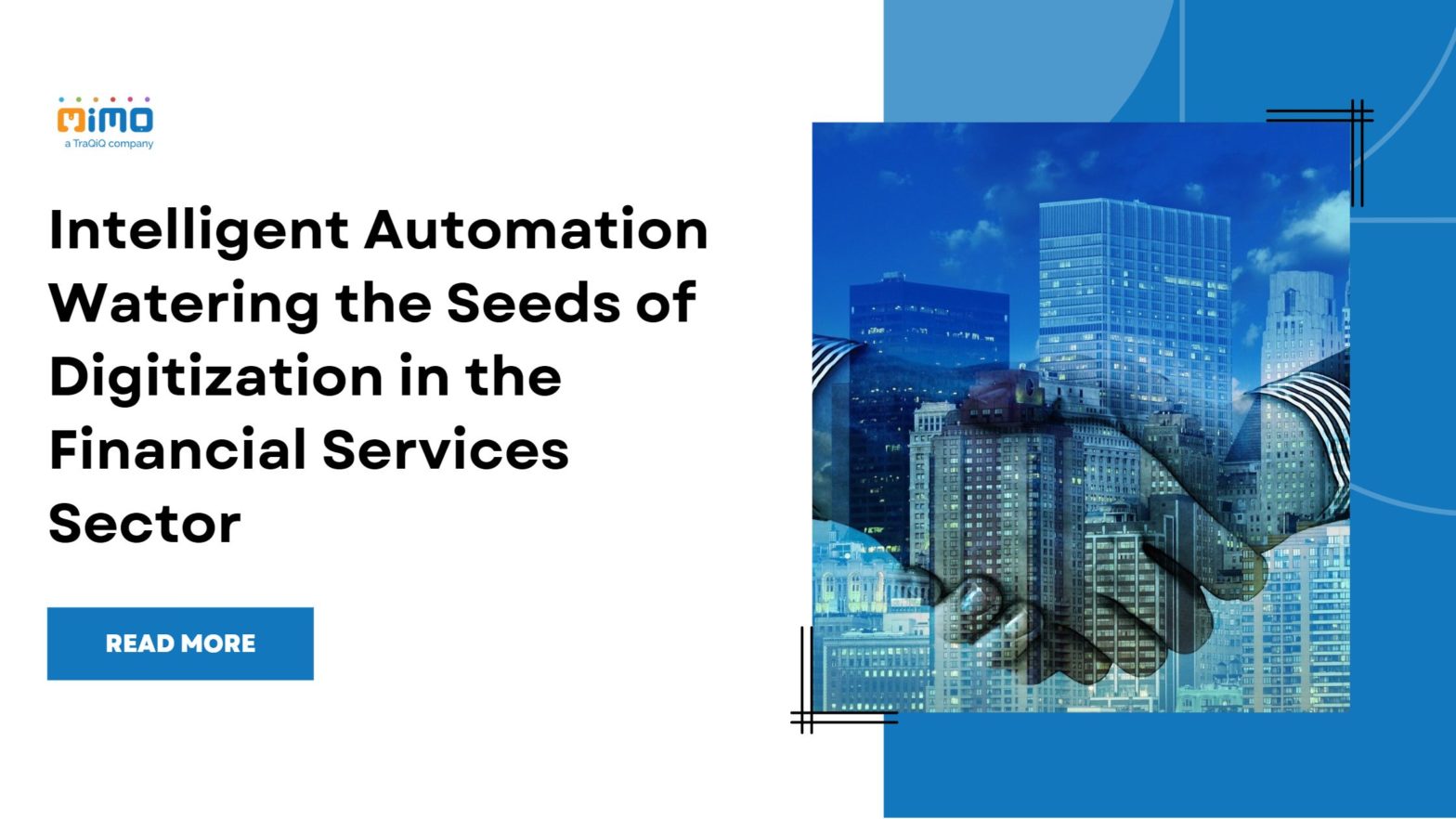
How Intelligent Automation Is Transforming Financial Services
Companies in the financial services industry have long embraced automation. Businesses today consider it a necessity to explore the potential of Artificial Intelligence (AI) to generate value through enhanced revenue, customer service, efficiency, and risk management.
According to surveys, the financial services sector accounts for 29% of the total market for Robotic Process Automation (RPA), which is more than any other industry. So, it makes sense that the sector is an early adopter of Intelligent Automation, which combines RPA and AI. And the future looks even more promising!
“Intelligent Automation,” which combines the benefits of Robotic Process Automation (RPA), Artificial Intelligence (AI), and Human Intelligence, will drive the future of financial services organizations. This entails the skillful application of a variety of automation techniques and tools, ranging from the incorporation of simple robots to the complete digitization of systems and processes.
Financial institutions have embraced a variety of use cases for Intelligent Automation, ranging from straightforward cognitive service connections into RPA systems to, in a few instances, AI-powered decision-making. Sounds interesting right? So, let’s dive in to experience the top applications of Intelligent Automation in the financial sector.
Table of Contents
Applications of Intelligent Automation
Curious to know about the magic spilled by Robotic Process Automation in banking? There are many applications for Intelligent Automation in the financial services industry. Let’s list some top ones here:
Detection of money laundering
One of the primary applications of Intelligent Automation in the financial industry is fraud detection because it not only expedites procedures but also improves the effectiveness of finding instances of money laundering. It gathers client and counterparty data from a variety of sources and issues warnings about possible AML transactions.
Automated financial consultants
These computer systems, also referred to as “robo-advisors,” offer financial advice with little to no human interaction. Using Machine Learning, they develop a unique financial strategy for each client based on characteristics like age, investment objectives, and risk tolerance.
Automated trading
It is a type of financial trading where automated choices are made using sophisticated algorithms. To trade equities, bonds, foreign exchange, and other financial instruments, banks, hedge funds, and institutional investors use this.
Transaction analysis and risk monitoring
In financial services, Intelligent Automation enables quicker data processing, precise forecasting, and the early detection of possible issues.
Document processing and scanning
Several manual operations can be automated thanks to Intelligent Automation, including the creation of customer accounts, which take a lot of time to complete. By extracting important data and information and examining legal papers, its use in financial reporting enabled data verification and improved reporting. Financial services organizations may change manual and data-intensive procedures with Intelligent Automation while still adhering to constantly evolving regulatory standards.

Personal finance management
AI is being used by an expanding number of personal financial management (PFM) apps to assist users in managing their finances. They can keep tabs on your spending, provide budgeting guidance, and provide recommendations for how to spend your money. Further “round-up” functions that automatically invest your spare change are now available in several PFM programs.
Blockchain
A decentralized, distributed ledger that records financial transactions is known as a blockchain. It is safe and impervious to tampering, making it the perfect platform for financial institutions. Companies utilize it to improve security, cut expenses, and streamline business processes. Banks, for instance, use blockchain to settle international payments and trade finance agreements.
Accounting closure
Supporting a financial closing is one of the top RPA in banking use cases. A sub-ledger must be maintained for all of the year’s spending, receipts, and transactions, which takes a lot of work. Companies can automate the process of data extraction and recording in the appropriate sub-ledgers thanks to RPA technology. You don’t need to account for hundreds of invoices, receipts, and paperwork. RPA assists staff members with closing yearly and monthly accounts by delivering the appropriate data at the appropriate time and in the appropriate format.
Peer-to-peer lending (P2P)
People can borrow and lend money through P2P lending, a financial technology, without using a traditional financial institution. Borrowers can get money more quickly and affordably, and lenders can make interest on their loans.
Enriching customer services

Intelligent Automation simplifies locating the most suitable financial products for customers while maximizing sales and customer support. A few examples of use cases in this area include – the introduction of chatbots in financial services, which decreases waiting times and gives clients a self-help option, enhancing the customer experience.
Nearly one-fifth, or 17% of financial services executives, confirm that investing in innovative digital capabilities is a must to prepare for the future.
By automating application logins or commissioning procedures, financial organizations also empower customer service representatives to enjoy their jobs with the minimum workload, allowing them to provide consumers with better, quicker service.
Advantages of Intelligent Automation in Financial Services
Let’s now concentrate on the advantages of employing Intelligent Automation in the financial services industry:
- Reduced costs: Automate manual and data-intensive operations to boost output and cut down on the cost of manual labor.
- Improve operations and lower risks: Reduce operational risks by streamlining and automating manual procedures and getting rid of processing errors.
- Streamline compliance: To enhance customer knowledge (KYC) and anti-money laundering (AML) process analysis, automate monitoring of ongoing transactions, and keep track of regulatory changes, direct customer data access is necessary.
- Enhancing client service: Get real-time access to client data, quicken the processing of their requests, and discover additional needs for products and services.
- Increase return on investment quickly: Get quick ROI by implementing Intelligent Automation without any complicated integrations required.
- Improve employee productivity: Improve employee satisfaction and productivity by deploying digital workers, who will empower staff and boost capacity during periods of high processing load.
Automation Intelligence Leads Financial Institutes to the Tech-Ready Future
RPA technology is required due to the increased complexity of financial operations and the ever-increasing demand for excellence from customers. With automation at play, the team can concentrate on direct revenue-generating tasks and innovation.
Truly, the future of the financial services sector appears promising with the development of AI and automation. These innovations will improve transaction efficiency and accuracy, freeing up staff time for higher-value activities. Financial institutions that adopt this cutting-edge technology will be competitive in the future.
Like this article?
More To Explore

What Factors Should Organizations Consider Before Outsourcing Their Internal Audit Functions?
+91 1141182211 Outsourcing has become a strategic choice for many organizations looking to streamline operations, reduce costs, and enhance efficiency.

Outsourcing Internal Audit: Evaluating the Upsides and Downsides for Your Organization
+91 1141182211 In today’s dynamic business environment, companies face increasing pressure to enhance efficiency, manage risks effectively, and ensure compliance

A Background Verification Guide: Frequently Asked Questions and Their Answers
+91 1141182211 Background verification (BGV) is a crucial process used by employers to ensure they are hiring candidates with accurate

